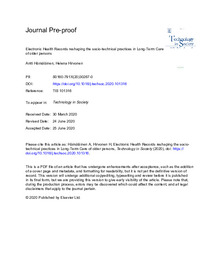Electronic Health Records reshaping the socio-technical practices in Long-Term Care of older persons

Tiedosto(t)
Rinnakkaistallenteen versio
final draftPäivämäärä
2020Tekijä(t)
Yksilöllinen tunniste
10.1016/j.techsoc.2020.101316Metadata
Näytä kaikki kuvailutiedotLisätietoa
Rinnakkaistallenne
Viittaus
Hämäläinen, Antti. Hirvonen, Helena. (2020). Electronic Health Records reshaping the socio-technical practices in Long-Term Care of older persons. Technology in society, 62, 101316. 10.1016/j.techsoc.2020.101316.Oikeudet
Tiivistelmä
Electronic Health Records (EHRs) in Long-Term Care (LTC) of older persons are expected to improve resident-centered care by reducing ambiguities in information coordination between LTC workers and organisations. While there are research findings concerning such intended outcomes, we are interested in analysing what sort of other, possibly unanticipated outcomes the use of EHRs in LTC may produce. We argue that the scrutiny of EHRs in LTC requires an understanding of their implementation as socio-technical processes, whereby EHRs are perceived as performative artifacts of LTC rather than technological tools or passive objects. While EHRs have been extensively studied in health-care settings, few studies have concentrated on eldercare settings. We aim to fill these gaps by drawing from a qualitative interview study (n = 25) conducted with Finnish LTC workers in 2018. Using thematic content analysis, we analyse how LTC workers negotiate and interpret socio-technical practices of EHR-use at their workplace. Our findings suggest that, along with improving workers’ accountability, EHRs are also considered disorganised, unrefined and burdening, thereby disrupting both the intended effects of EHRs and the continuity and the nuanced characteristics of caring.


